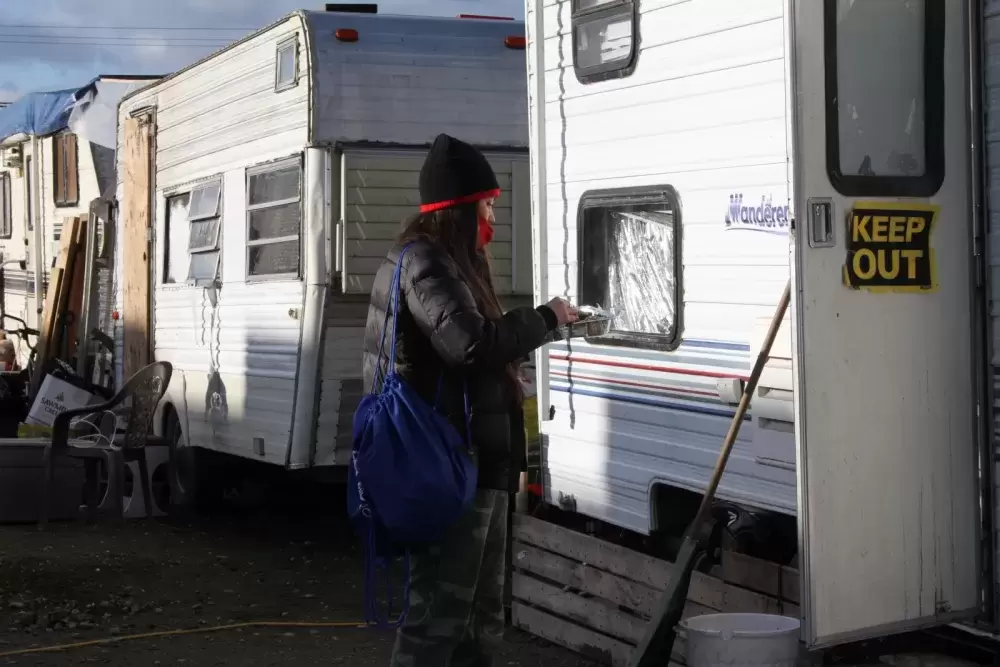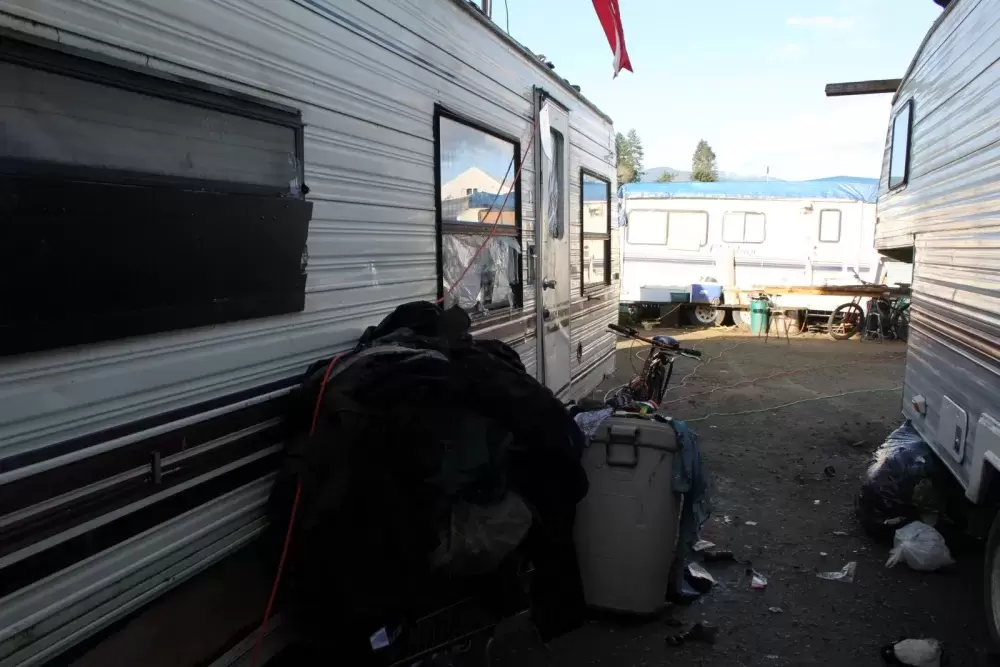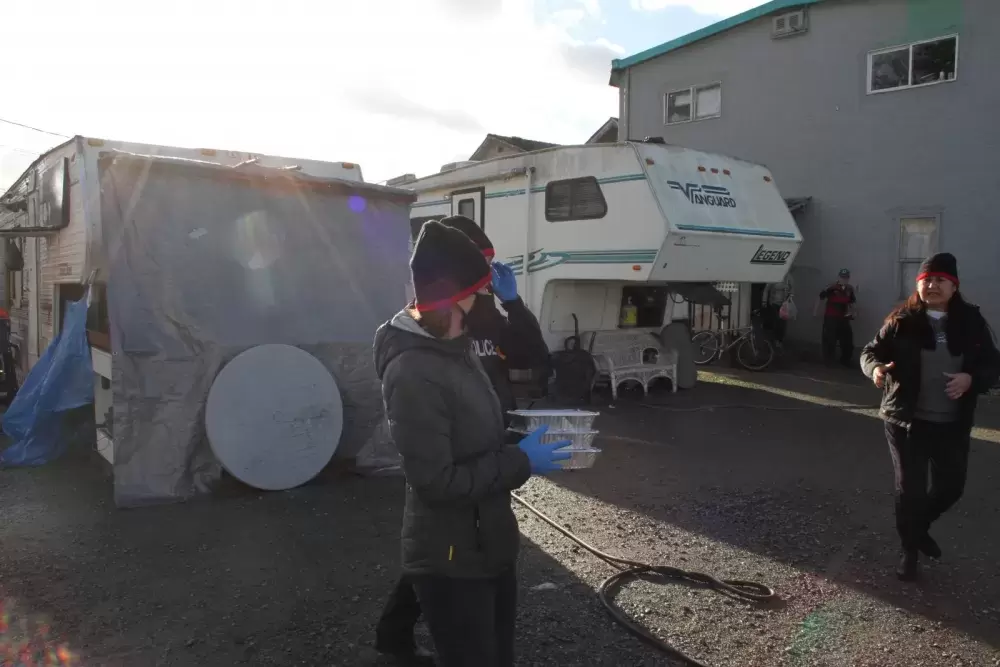The controversial trailers located at the Wintergreen Apartments on Fourth Avenue in Port Alberni will be removed from the property, said owner Randy Brown.
Brown brought the trailers to an empty lot he owns after seeing a spike of people sleeping outside on sidewalks within the lower Fourth Avenue corridor in 2020.
“I have a big heart,” he said. “I can’t handle seeing these people out in the cold.”
His solution was to move around nine trailers onto his property to provide a housing solution for the homeless.
“I sent the letter to the city and said what I was going to do,” recounted Brown. “I didn't get a response, but I told them, either we can do it together, or I was going to do it on my own. And I did what I said I was going to do – I did it on my own.”
The move was opposed by the city and on Nov. 23, 2020, council passed a remedial action requirement for the property owner to remove all trailers, as they were deemed unsafe and violated city bylaws.
“We are absolutely not okay with the trailers being there because the condition people are living in puts those people at significant risk,” said Port Alberni Mayor Sharie Minions. “There’s extension cords powering the trailers, there’s not proper sewage, there’s garbage everywhere. The property is not being taken care of.”
Without alternative housing solutions, Minions said the city is not going to displace anyone from the trailers, especially in the middle of winter, but that “it’s not ok if [Brown] keeps the trailers.”
It’s a complex issue, she admitted.
Since 1999, Brown has been running a property management business and currently oversees more than 20 commercial and residential properties in Port Alberni.
He is charging the Fourth Avenue trailer residents rent but said he’s not making nearly enough for his daily troubles.
Minions said she feels the residents are being taken advantage of.
“We hear reports frequently from social workers and different service providers in that area of three or four people living in tiny little trailers that are not properly heated, and yet paying rent,” she said. “It's just not acceptable. It's exploiting the people in our community who are most vulnerable.”
After several site visits at the beginning of 2021, Gaylene Thorogood, manager of community safety with the City of Port Alberni, said “three of the units are tied into the property's sewer system without inspection or permits and refuse continues to accumulate.”
“The present condition of the building and the use of the property contravenes city bylaw and compromises the safety of both the occupants and emergency personnel who respond to the calls at this location,” she added.
Thorogood said service calls to site nearly doubled since the trailers moved onto the property in 2020 and RCMP were making nearly daily visits.
Several months ago, Minions said she sat down with Brown to discuss options that would improve the safety of the people living in the trailers.
“We gave him some really specific options on what he could bring forward, and he never took any action,” she said.
While she has yet to see any improvements, Minions said she’s “happy” to hear that Brown intends to clean the property up.
Brown said it has become clear that a new approach is needed.
“Clearly the trailers need to go,” he said in a release, adding that he agrees a safe alternative housing option must be available before the occupants are displaced.
“It’s been quite a rollercoaster ride taking care of all of these people,” said Brown. “I’m not a social worker.”
Garbage has been increasingly difficult to stay on top of, as Brown said it’s been hard to find anyone willing to work at the property.
“It’s a nightmare,” he said. “I want to move on.”
For the past 61 years, Brown has called Port Alberni home and said the issue of homelessness continues to get worse.
“It breaks my heart that we can’t find a simple solution,” he said.
A task force was created by the city to develop an immediate solution for the residents living in the Fourth Avenue trailers, in collaboration with the Nuu-chah-nulth Tribal Council (NTC), the Port Alberni Friendship Centre, as well as Tseshaht and Hupacasath First Nations.
“The people [living] on Fourth Avenue seek personal space,” said NTC Vice-President Mariah Charleson. “Something that belongs to them – a place where they can keep their belongings safe.”
A no-barrier, non-discriminatory housing solution is critical, she said.
Port Alberni’s 2021 homeless count indicated a significant increase in the number of people who identified as Indigenous, rising to 65 per cent from 48 per cent in 2018. Only 17 per cent of Port Alberni’s general population are Indigenous, according to the 2016 census.
“Our relatives are struggling day-in and day-out to just find a warm place to lay their head at night,” said Charleson. “We can't just leave these people homeless, because we know that we already have a crisis in Port Alberni.”
Without access to services that are culturally appropriate or safe, Charleson said many Indigenous people don’t feel comfortable seeking help.
Following the success of the sleeping pod model in Duncan, the task team is considering implementing a similar system in Port Alberni. The pods are small, insulated sleeping units with lighting and heating that provide the homeless with a safe and dry place to rest their heads at night.
It would act as an immediate solution, until a permanent, long-term option is identified, said Minions.
“This is not a permanent option for people to live in, but until a permanent option is created, we feel that there needs to be a safer, immediate alternative,” she added.
The task team has only met once. Another meeting is anticipated to take place in a week or two.
As soon as a housing solution is presented and there is somewhere safe for the Fourth Avenue residents to go, Brown said the trailers will be removed “immediately."



